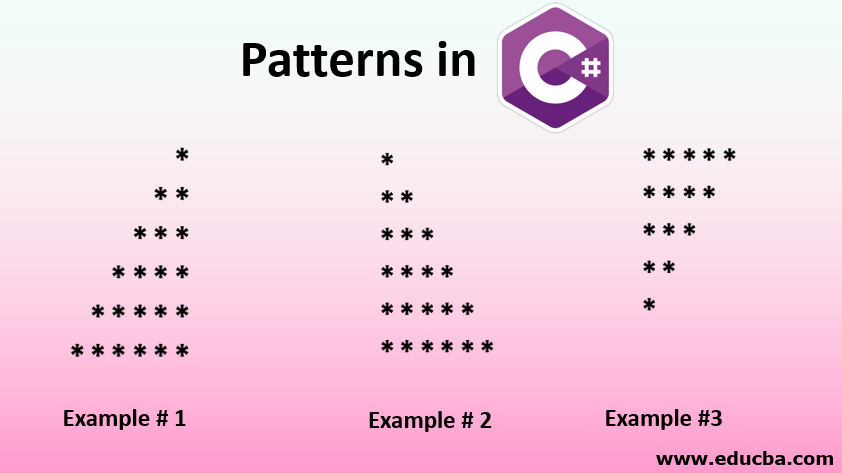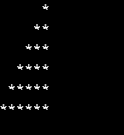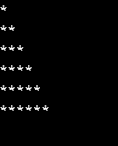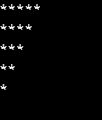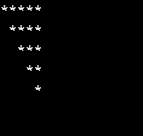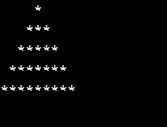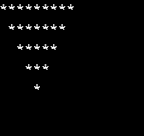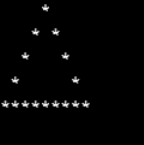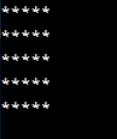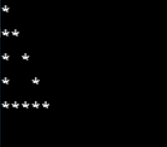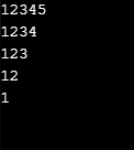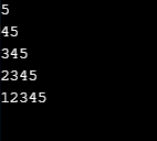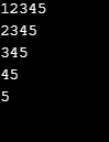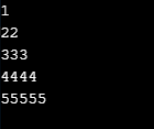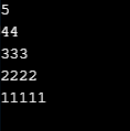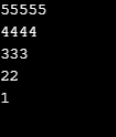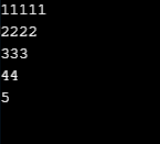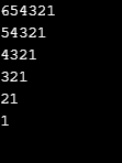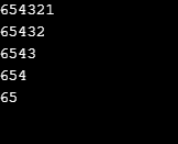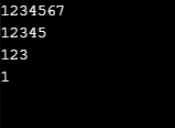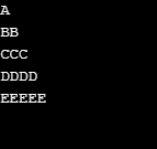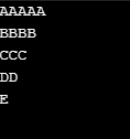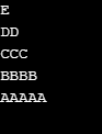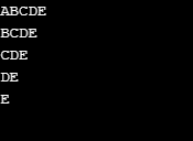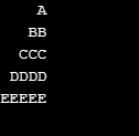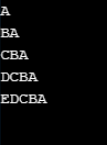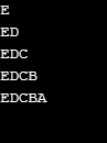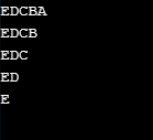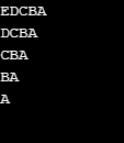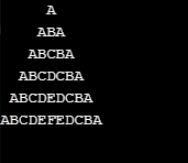Updated March 17, 2023
Introduction to Patterns in C#
Patterns are the repeated decorative design. There is a simple code to write patterns in C#. We can write code to print different types of patterns like star pattern, character pattern and number pattern. Below are the various examples to print patterns of star, character and numeric values. These examples consist of loops or nested loops which is a loop inside for a loop. Patterns are a way of designing in sequence or in a logical manner. We can print triangles, pyramids, diamonds, and other symmetries.
Top 3 types of Patterns in C#
The top 3 types of patterns in c# are mentioned below.
1. Star Pattern
The following are examples to print star patterns.
Example #1
using System;
using System.Collections.Generic;
using System.Linq;
using System.Text;
namespace StarPattern
{
class Program
{
static void Main(string[] args)
{
int x, y, z;
for (x =6; x >= 1; x--)
{
for (y = 1; y < x; y++)
{
Console.Write(" ");
}
for (z = 6; z >= x; z--)
{
Console.Write("*");
}
Console.WriteLine();
}
Console.ReadLine();
}
}
}Output:
Example #2
using System;
using System.Collections.Generic;
using System.Linq;
using System.Text;
namespace StarPattern
{
class Program
{
static void Main(string[] args)
{
int x, y;
for (x = 1; x <= 6; x++)
{
for (y = 1; y <= x; y++)
{
Console.Write("*");
}
Console.WriteLine();
}
Console.ReadLine();
}
}
}Output:
Example #3
using System;
using System.Collections.Generic;
using System.Linq;
using System.Text;
namespace StarPattern
{
class Program
{
static void Main(string[] args)
{
int x, y;
for (x = 5; x >= 1; x--)
{
for (y = 1; y <= x; y++)
{
Console.Write("*");
}
Console.WriteLine();
}
Console.ReadLine();
}
}
}Output:
Example #4
using System;
using System.Collections.Generic;
using System.Linq;
using System.Text;
namespace StarPattern
{
class Program
{
static void Main(string[] args)
{
int x, y, z;
for (x = 5; x >= 1; x--)
{
for (y = 5; y > x; y--)
{
Console.Write(" ");
}
for (z = 1; z <=x; z++)
{
Console.Write("*");
}
Console.WriteLine();
}
Console.ReadLine();
}
}
}Output:
Example #5
using System;
using System.Collections.Generic;
using System.Linq;
using System.Text;
namespace StarPattern
{
class Program
{
static void Main(string[] args)
{
int x, y, z;
for (x= 1; x <= 5; x++)
{
for (y = x; y < 5; y++)
{
Console.Write(" ");
}
for (z = 1; z < (x * 2); z++)
{
Console.Write("*");
}
Console.WriteLine();
}
Console.ReadLine();
}
}
}Output:
Example #6
using System;
using System.Collections.Generic;
using System.Linq;
using System.Text;
namespace StarPattern
{
class Program
{
static void Main(string[] args)
{
int x, y, z;
for (x = 5; x >= 1; x--)
{
for (y = 5; y > x; y--)
{
Console.Write(" ");
}
for (z = 1; z < (x * 2); z++)
{
Console.Write("*");
}
Console.WriteLine();
}
Console.ReadLine();
}
}
}Output:
Example #7
using System;
using System.Collections.Generic;
using System.Linq;
using System.Text;
namespace StarPattern
{
class Program
{
static void Main(string[] args)
{
int x, y;
for (x = 1; x <= 5; x++)
{
for (y = x; y < 5; y++)
{
Console.Write(" ");
}
for (y = 1; y <= (2 * x - 1); y++)
{
if (x == 5 || y == 1 || y == (2 * x - 1))
{
Console.Write("*");
}
else
{
Console.Write(" ");
}
}
Console.WriteLine();
}
Console.ReadLine();
}
}
}Output:
Example #8
using System;
using System.Collections.Generic;
using System.Linq;
using System.Text;
namespace CharacterPattern
{
class Program
{
static void Main(string[] args)
{
int x, y;
for (x = 1; x <= 5; x++)
{
for (y = 1; y <= 5; y++)
{
Console.Write("*");
}
Console.WriteLine();
}
Console.ReadLine();
}
}
}Output:
Example #9
using System;
using System.Collections.Generic;
using System.Linq;
using System.Text;
namespace CharacterPattern
{
class Program
{
static void Main(string[] args)
{
int x, y;
for (x = 1; x <= 5; x++)
{
for (y = 1; y <= x; y++)
{
if (y == 1 || y== x || x == 5)
{
Console.Write("*");
}
else
{
Console.Write(" ");
}
}
Console.WriteLine();
}
Console.ReadLine();
}
}
}Output:
2. Number Patterns
The following are examples to print number patterns.
Example #1
using System;
using System.Collections.Generic;
using System.Linq;
using System.Text;
namespace NumberPattern
{
class Program
{
static void Main(string[] args)
{
int x, y;
for (x = 1; x <= 5; x++)
{
for (y = 1; y <= x; y++)
{
Console.Write(y);
}
Console.WriteLine();
}
Console.ReadLine();
}
}
}Output:
Example #2
using System;
using System.Collections.Generic;
using System.Linq;
using System.Text;
namespace NumberPattern
{
class Program
{
static void Main(string[] args)
{
int x, y;
for (x = 5; x >= 1; x--)
{
for (y = 1; y <= x; y++)
{
Console.Write(y);
}
Console.WriteLine();
}
Console.ReadLine();
}
}
}Output:
Example #3
using System;
using System.Collections.Generic;
using System.Linq;
using System.Text;
namespace NumberPattern
{
class Program
{
static void Main(string[] args)
{
int x, y;
for (x = 5; x >= 1; x--)
{
for (y = x; y <= 5; y++)
{
Console.Write(y);
}
Console.WriteLine();
}
Console.ReadLine();
}
}
}Output:
Example #4
using System;
using System.Collections.Generic;
using System.Linq;
using System.Text;
namespace NumberPattern
{
class Program
{
static void Main(string[] args)
{
int x, y;
for (x = 1; x <= 5; x++)
{
for (y = x; y <= 5; y++)
{
Console.Write(y);
}
Console.WriteLine();
}
Console.ReadLine();
}
}
}Output:
Example #5
using System;
using System.Collections.Generic;
using System.Linq;
using System.Text;
using System.Threading.Tasks;
namespace NumberPattern
{
class Program
{
static void Main(string[] args)
{
int x, y;
for (x = 1; x <= 5; x++)
{
for (y = 1; y <= x; y++)
{
Console.Write(x);
}
Console.WriteLine();
}
Console.ReadLine();
}
}
}Output:
Example #6
using System;
using System.Collections.Generic;
using System.Linq;
using System.Text;
using System.Threading.Tasks;
namespace NumberPattern
{
class Program
{
static void Main(string[] args)
{
int x, y;
for (x = 5; x >= 1; x--)
{
for (y = 5; y >= x; y--)
{
Console.Write(x);
}
Console.WriteLine();
}
Console.ReadLine();
}
}
}Output:
Example #7
using System;
using System.Collections.Generic;
using System.Linq;
using System.Text;
using System.Threading.Tasks;
namespace NumberPattern
{
class Program
{
static void Main(string[] args)
{
int x, y;
for (x = 5; x >= 1; x--)
{
for (y = 1; y <= x; y++)
{
Console.Write(x);
}
Console.WriteLine();
}
Console.ReadLine();
}
}
}Output:
Example #8
using System;
using System.Collections.Generic;
using System.Linq;
using System.Text;
using System.Threading.Tasks;
namespace NumberPattern
{
class Program
{
static void Main(string[] args)
{
int x, y;
for (x = 1; x <= 5; x++)
{
for (y = 5; y >= x; y--)
{
Console.Write(x);
}
Console.WriteLine();
}
Console.ReadLine();
}
}
}Output:
Example #9
using System;
using System.Collections.Generic;
using System.Linq;
using System.Text;
using System.Threading.Tasks;
namespace NumberPattern
{
class Program
{
static void Main(string[] args)
{
int x, y;
for (x = 6; x >= 1; x--)
{
for (y = x; y >= 1; y--)
{
Console.Write(y);
}
Console.WriteLine();
}
Console.ReadLine();
}
}
}Output:
Example #10
using System;
using System.Collections.Generic;
using System.Linq;
using System.Text;
using System.Threading.Tasks;
namespace NumberPattern
{
class Program
{
static void Main(string[] args)
{
int x, y;
for (x = 1; x <= 5; x++)
{
for (y = 6; y >= x; y--)
{
Console.Write(y);
}
Console.WriteLine();
}
Console.ReadLine();
}
}
}Output:
Example #11
using System;
using System.Collections.Generic;
using System.Linq;
using System.Text;
using System.Threading.Tasks;
namespace NumberPattern
{
class Program
{
static void Main(string[] args)
{
int x, y;
for (x = 7; x >= 1; x -= 2)
{
for (y = 1; y <= x; y++)
{
Console.Write(y);
}
Console.WriteLine();
}
Console.ReadLine();
}
}
}Output:
3. Character Pattern
The following are examples to print character patterns.
Example #1
using System;
using System.Collections.Generic;
using System.Linq;
using System.Text;
namespace CharacterPattern
{
class Program
{
static void Main(string[] args)
{
int x, y;
int z = 5;
for (x = 1; x <= z; x++)
{
for (y = 1; y <= x; y++)
{
Console.Write((char)(x + 64));
}
Console.WriteLine("");
}
Console.ReadLine();
}
}
}Output:
Example #2
using System;
using System.Collections.Generic;
using System.Linq;
using System.Text;
namespace CharacterPattern
{
class Program
{
static void Main(string[] args)
{
int x, y;
int z = 5;
for (x = 1; x <= z; x++)
{
for (y = x; y <= z; y++)
{
Console.Write((char)(x + 64));
}
Console.WriteLine("");
}
Console.ReadLine();
}
}
}Output:
Example #3
using System;
using System.Collections.Generic;
using System.Linq;
using System.Text;
namespace CharacterPattern
{
class Program
{
static void Main(string[] args)
{
int x, y;
int z = 5;
for (x = 1; x <= z; x++)
{
for (y = 1; y <= x; y++)
{
Console.Write((char)(z - x + 1 + 64));
}
Console.WriteLine("");
}
Console.ReadLine();
}
}
}Output:
Example #4
using System;
using System.Collections.Generic;
using System.Linq;
using System.Text;
namespace CharacterPattern
{
class Program
{
static void Main(string[] args)
{
int x, y;
int z = 5;
for (x = 1; x <= z; x++)
{
for (y = x; y<= z; y++)
{
Console.Write((char)(y + 64));
}
Console.WriteLine();
}
Console.ReadLine();
}
}
}Output:
Example #5
using System;
using System.Collections.Generic;
using System.Linq;
using System.Text;
namespace CharacterPattern
{
class Program
{
static void Main(string[] args)
{
int x, y, z;
int k = 5;
for (x = 1; x <= k; x++)
{
for (y = 1; y <= k - x; y++)
{
Console.Write(" ");
}
for (z = 1; z <= x; z++)
{
Console.Write((char)(x + 64));
}
Console.WriteLine();
}
Console.ReadLine();
}
}
}Output:
Example #6
using System;
using System.Collections.Generic;
using System.Linq;
using System.Text;
namespace CharacterPattern
{
class Program
{
static void Main(string[] args)
{
int x, y;
int a = 5;
for (x = 1; x <= a; x++)
{
for (y = x; y >= 1; y--)
{
Console.Write((char)(y + 64));
}
Console.WriteLine("");
}
Console.ReadLine();
}
}
}Output:
Example #7
using System;
using System.Collections.Generic;
using System.Linq;
using System.Text;
namespace CharacterPattern
{
class Program
{
static void Main(string[] args)
{
int x, y;
int a = 5;
for (x = a; x >= 1; x--)
{
for (y = a; y >= x; y--)
{
Console.Write((char)(y + 64));
}
Console.WriteLine("");
}
Console.ReadLine();
}
}
}Output:
Example #8
using System;
using System.Collections.Generic;
using System.Linq;
using System.Text;
namespace CharacterPattern
{
class Program
{
static void Main(string[] args)
{
int x, y;
int a = 5;
for (x = 1; x <= a; x++)
{
for (y = a; y >= x; y--)
{
Console.Write((char)(y + 64));
}
Console.WriteLine("");
}
Console.ReadLine();
}
}
}Output:
Example #9
using System;
using System.Collections.Generic;
using System.Linq;
using System.Text;
namespace CharacterPattern
{
class Program
{
static void Main(string[] args)
{
int x, y;
int z = 5;
for (x = z; x >= 1; x--)
{
for (y = x; y >= 1; y--)
{
Console.Write((char)(y + 64));
}
Console.WriteLine("");
}
Console.ReadLine();
}
}
}Output:
Example #10
using System;
using System.Collections.Generic;
using System.Linq;
using System.Text;
namespace CharacterPattern
{
class Program
{
static void Main(string[] args)
{
int x, y;
int z = 6;
for (x = 1; x <= z; x++)
{
for (y = 1; y<= z - x; y++)
{
Console.Write(" ");
}
for (y = 1; y <= x; y++)
{
Console.Write((char)(y + 64));
}
for (y = x - 1; y >= 1; y--)
{
Console.Write((char)(y + 64));
}
Console.WriteLine();
}
Console.ReadLine();
}
}
}Output:
Conclusion
So above are some examples of various types of patterns. We can print any type of pattern with some changes in the loops.
Recommended Articles
This is a guide to Patterns in C#. Here we discuss the introduction and top 3 types of Patterns in C# along with its examples and code implementation. You may also look at the following articles to learn more-

